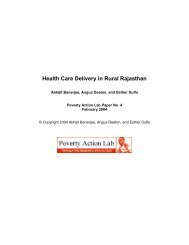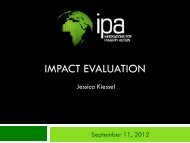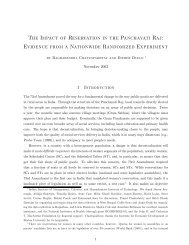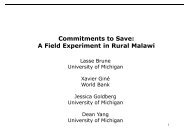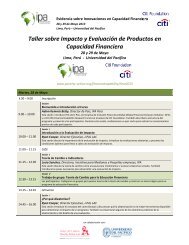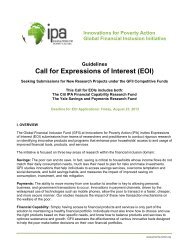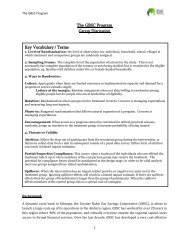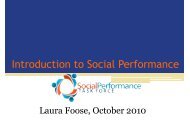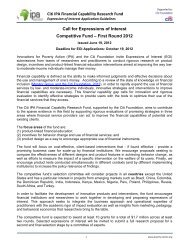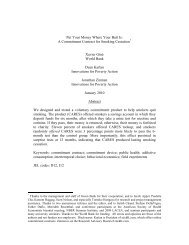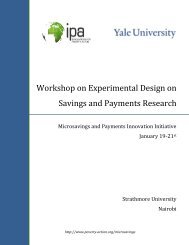David Yanagizawa-Drott - Innovations for Poverty Action
David Yanagizawa-Drott - Innovations for Poverty Action
David Yanagizawa-Drott - Innovations for Poverty Action
You also want an ePaper? Increase the reach of your titles
YUMPU automatically turns print PDFs into web optimized ePapers that Google loves.
Leakages and Market Failures in<br />
the Provision of Health Products<br />
<strong>David</strong> <strong>Yanagizawa</strong>-<strong>Drott</strong><br />
Assistant Professor of Public Policy, HKS<br />
Harvard University
Motivation<br />
• Fake medicines are a global public health<br />
problem<br />
• Evidence of antimalarial drug quality (Nayyar<br />
et al., 2012)<br />
• Sampled countries in Southeast Asia: Cambodia,<br />
China, India, Laos, Myanmar, Thailand<br />
• 35% of medicines in public and private outlets<br />
are fake<br />
• Prevalence in Sub-Saharan Africa equally high<br />
• Similar problem <strong>for</strong> antibiotics
Common Explanations<br />
• Profit motives at all levels in the global supply-chain:<br />
manufacturers, counterfeiters, government officials, health<br />
care workers, wholesalers, retail drug shops<br />
• Insufficient internal quality-control in production process<br />
and regulation and monitoring of the supply-chain<br />
• Imperfect competition<br />
• Widespread self-prescription and poor knowledge about<br />
product authenticity among consumers<br />
However, there is essentially no evidence of how supply<br />
and demand <strong>for</strong>ces drive drug quality, and how to combat<br />
the problem<br />
- We provide evidence from the private retail sector in<br />
Uganda (Bjorkman, Svensson, <strong>Yanagizawa</strong>-<strong>Drott</strong>, 2012)
Which one is fake?
Which one is fake?<br />
Fake Authentic
Are fake drugs cheaper?<br />
• Prices may “signal” quality<br />
• The problem may be less severe if households<br />
can pay a little extra and get authentic drugs<br />
• However, the data from Ugandan drugs shops<br />
shows that fake drugs are on average sold at<br />
the same price as authentic drugs
Do households suspect fake drugs?<br />
• Households may partially realize that drugs are<br />
fake and ineffective<br />
• This would lead to lower demand and<br />
treatments among households that believe the<br />
drugs are fake<br />
• We used household survey data from Uganda<br />
to investigate this
Do households suspect fake drugs?<br />
60%<br />
50%<br />
40%<br />
30%<br />
20%<br />
10%<br />
0%<br />
18%<br />
41%<br />
53%<br />
49%<br />
Mpigi Mbale Bushenyi Mbarara<br />
% Drug Shops Selling Fake Drugs % HH Believes Fake Drugs Are Sold
Is the problem lack of competition?<br />
Local Competition in Ugandan villages<br />
Local<br />
Monopoly<br />
51%<br />
Local<br />
Competition<br />
49%
Is the problem lack of competition?
Randomized Experiment<br />
• NGO Collaboration: BRAC and Living Goods<br />
• Intervention:<br />
a. Door-to-door Community Health Promoter (CHP) selling<br />
authentic antimalarial drugs at a 20-25% subsidized price<br />
b. ~100 sample villages, half randomly assigned CHP<br />
• Theory of Change: By having an NGO provider<br />
that sells authentic drugs at low price:<br />
a. Households will get access to authentic<br />
medicines, which can increase treatments<br />
b. Market <strong>for</strong>ces could drive out the bad drugs from<br />
private outlets due to the NGO
Randomized Experiment
Impact: Drug Quality in Drug Shops<br />
Program Impact:<br />
20 %-points fewer drug shops sell fake drugs
Impact: Price in Drug Shops<br />
Program Impact:<br />
18% lower prices
Impact: Treatment of Sick Children<br />
Program Impact:<br />
39% increase in antimalarial medicine use
Conclusion and Way Forward<br />
• Evidence of positive market externalities: Fake<br />
drugs in private outlets can be driven out by<br />
the entry of an NGO committed to high quality<br />
and low price<br />
• Interventions directly targeting the retail<br />
sector can be highly effective<br />
• Potential interventions and policies:<br />
• Monitoring of quality in public and private<br />
outlets<br />
• Technological solutions<br />
• Certification and consumer in<strong>for</strong>mation schemes



